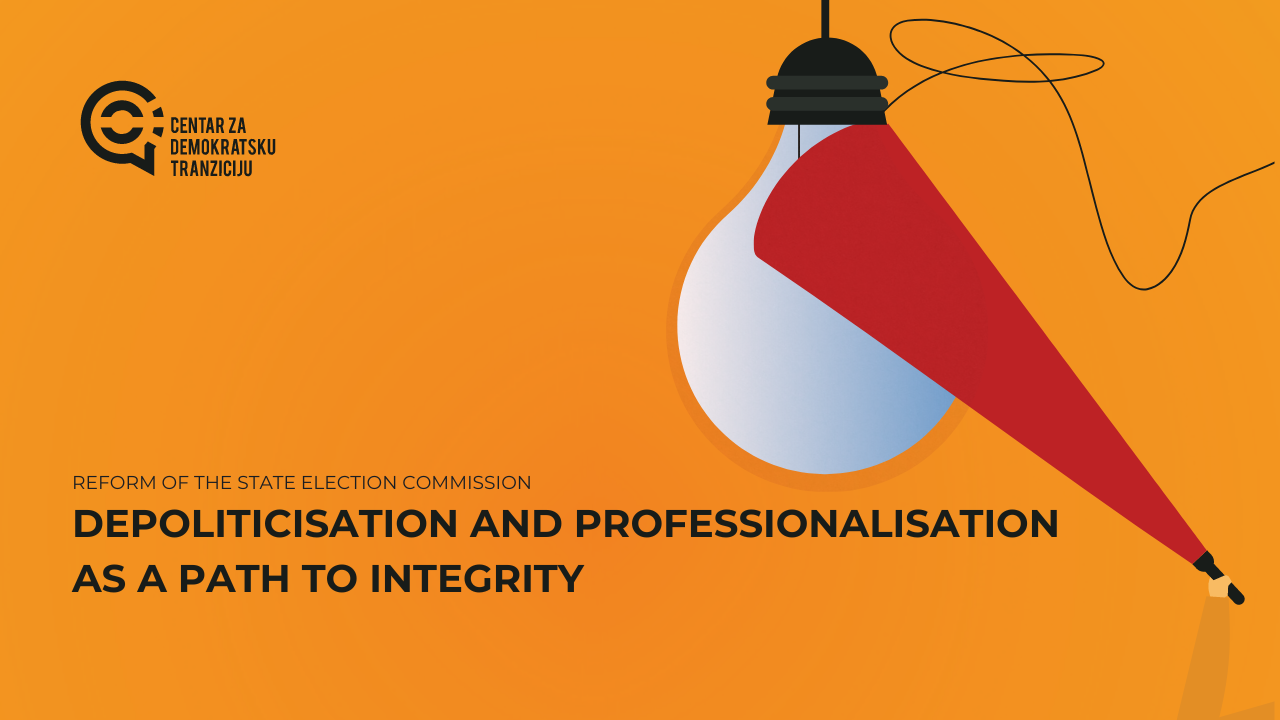Some of the key tasks of the upcoming electoral reform include the depoliticization and professionalization of the State Electoral Commission and the progressive professionalization of the electoral administration at lower tiers; these tasks are pivotal for the reform to be considered both fundamental and comprehensive.
An inclusive process would entail considering comparative approaches and models and examining them from the standpoint of the widely recognized standards of democratic elections, so as to come up with a proposition for a model that would safeguard the independence of electoral processes by enforcing strict standards of impartiality, expertise and ethics for members of the electoral administration bodies.
These are the key findings of the analysis “Reform of the State Electoral Commission: Depoliticisation and Professionalisation as a Path to Integrity” by Dr. Nikola Mugosa, which was produced by the Center for Democratic Transition (CDT) and submitted to the Comprehensive Electoral Reform Committee with the aim of contributing to a more informed discussion and finding the best models and solutions for building trust in the electoral process. We will also release another publication in the coming days that will discuss the need to reorganize SEC and broaden its scope of work.
While in many Western European democracies with robust institutions and a track record of impartial operation elections are largely organized by a special branch of the executive power, this model cannot ensure impartiality in emerging or transitioning democracies, which prompts a growing demand for independent electoral commissions. However, these commissions often tend to be made up of members that support the political majority or government, even in cases where the electoral administration is formally separated from the executive branch. Furthermore, true political independence is not guaranteed in the politically divided societies such as Montenegro’s, despite the fact that the law allows for the representation of all political parties.
This is precisely the kind of model that we have in Montenegro, where the formally balanced representation of opposition and government in the State Election Commission and other electoral administration bodies does not result in impartiality and professionalism. On the contrary, we have seen the State Election Commission make decisions based on political affiliation from one election cycle to the next, at the expense of impartial and lawful conduct of the electoral process.
The State Election Commission’s conduct during the 2023 presidential election will go down in history as an example of the election administration’s unacceptable political influence. Namely, the presidential candidate with the best chances of election victory was eliminated from the race, giving place to the other two contenders, after party representatives in the SEC teamed up with institutions of a foreign country (the Republic of Serbia), which are also under political control, in order to conjure up ad hoc procedures designed for one-off political use. This case vividly illustrates what happens when equal representation of opposition and government in electoral commission, which is supposed to serve as checks and balances for the election process, turns into its very own opposite – a harmonious collaboration against a common “political enemy”. Furthermore, this makes a compelling case for the urgent need for legislative action that would completely depoliticize and professionalize election administration.
The analysis highlights the need to elect non-partisan members with relevant expertise and experience in electoral processes as a way of professionalizing the State Electoral Commission (SEC). Using measurable criteria to select SEC members would reduce arbitrariness in the selection process itself. We also propose limiting the number of members to five or seven and extending the SEC’s mandate to six years to ensure independence in work and decision-making. It is also essential to establish clear criteria for dismissing an SEC member. Furthermore, the role of the SEC Secretary must be elevated to that of a head of professional service, rather than a member of the Commission. The SEC should have authority over the election and removal of members of municipal election commissions, which also need to be professionalized and staffed with members elected as based on merits. Lastly, in the event that municipal election commissions fail to carry out their duties in line with the law, the SEC should be authorized to take over their role.
This publication was created as part of the project “Electoral Reform in Focus: It’s Time!”, which is being implemented by the Centre for Democratic Transition (CDT) in cooperation with the Association for Responsible and Sustainable Development (UZOR) and the Association of Youth with Disabilities (UMHCG), with funding from the European Union via the EU Delegation in Montenegro. The sole responsibility for the content of this publication lies with the CDT, and it does not necessarily reflect the views of the European Union.
The full text of the analysis is available here.
We remain open to public discussion regarding the content of our publications, as well as to all the well-intentioned suggestions and criticisms.
Milica Kovacevic, CDT program director


